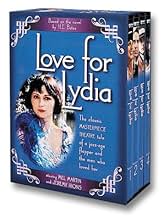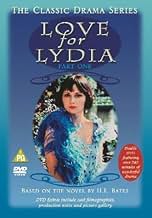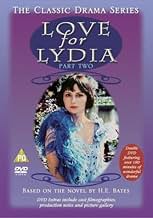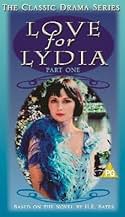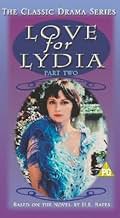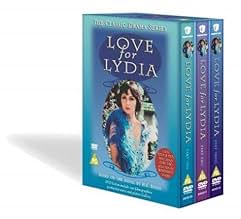Adicionar um enredo no seu idiomaA coming-of-age story from the perspective of Edward Richardson, a junior journalist who falls deeply in love with the enchanting and reckless Lydia Aspen, heiress of the wealthy but moribun... Ler tudoA coming-of-age story from the perspective of Edward Richardson, a junior journalist who falls deeply in love with the enchanting and reckless Lydia Aspen, heiress of the wealthy but moribund Aspen family.A coming-of-age story from the perspective of Edward Richardson, a junior journalist who falls deeply in love with the enchanting and reckless Lydia Aspen, heiress of the wealthy but moribund Aspen family.
- Indicado para 6 prêmios BAFTA
- 6 indicações no total
Explorar episódios
Avaliações em destaque
This excellent series was brought to American TV audiences on PBS' "Masterpiece Theatre" in 1979, two years after it first was aired in Great Britain. I saw it then, bought the book by H.E. Bates, and later purchased the DVD set. This is a superb adaptation of a subtle literary work on British pastoral life, the many segments of the series giving adequate time to fully bring out the nuance of the book. It has encouraged me to visit England many times to savor the beauty of the countryside and small town charm. I think the author would have been very pleased to see how well his book had been adapted for television, and sadly he died just a few years before the project was completed.
Mel Martin and Christopher Blake give touching performances, and it is sad to see that Christopher Blake has died in 2004 while only in his mid-50's. You get to see Jeremy Irons do some fine work long before he earned his Oscar. Peter Davison is also excellent, before he became famous in "All Creatures Great and Small" and "Dr. Who." The distinguished older actors and actresses in this production remind us of the enormous pool of talent that can be found in Great Britain, where noted stage stars frequently appear in television dramas. I highly recommend this DVD set.
Mel Martin and Christopher Blake give touching performances, and it is sad to see that Christopher Blake has died in 2004 while only in his mid-50's. You get to see Jeremy Irons do some fine work long before he earned his Oscar. Peter Davison is also excellent, before he became famous in "All Creatures Great and Small" and "Dr. Who." The distinguished older actors and actresses in this production remind us of the enormous pool of talent that can be found in Great Britain, where noted stage stars frequently appear in television dramas. I highly recommend this DVD set.
Have always loved period dramas, film and television and of all different periods/settings, from a very early age. This is a love that keeps increasing getting older, now at an age where what wasn't noticed or appreciated by me when younger is very much now, and the more, old and new and whether adapted from a book or not, watched. A love that is highly unlikely to ever go and my appreciation for them is actually even more.
'Love for Lydia' is not quite one of the classics to me, but it is still a great series that deserves wider recognition. It is great that those who have seen it remember it very fondly, it is not hard at all to see why. It's sumptuous, very entertaining and very charming, and its look at love in youth and the pain it can cause is hardly superficial or empty. Quite the opposite. One may on occasions feel the slow pace, where parts are a little too deliberate and aimless early on. 'Love for Lydia' though has held up very well where the numerous good things are so good that any pace reservations can be overlookable.
It looks great, with the period lovingly and handsomely recreated complemented beautifully by the photography. The music, with a gorgeous main theme that sticks in the mind forever, never intrudes in mood or placement and doesn't over-emphasise what the characters are feeling.
The writing is layered and thought-provoking, not feeling too talk-heavy or wordy, flowing with ease and smoothly too. The direction is relaxed but not too relaxed, the intimacy is brought out effectively but it doesn't get static. The story entertains, charms and moves, the bigger scenes are not too overblown and the smaller scenes are very sympathetically written and played.
A great cast also helps. Mel Martin (in some of her best work), as a character that one can see where the attraction is but also has flaws that frustrate like immaturity and selfishness, and Christopher Blake are appealing in the lead roles. The supporting cast is full of talent, with standouts as two of the most interesting characters being a larger than life Michael Aldridge, in a role he was born to play, and a pre-'Brideshead Revisited' Jeremy Irons already showing incredible promise again in a tailor made role.
Summing up, great series. 9/10
'Love for Lydia' is not quite one of the classics to me, but it is still a great series that deserves wider recognition. It is great that those who have seen it remember it very fondly, it is not hard at all to see why. It's sumptuous, very entertaining and very charming, and its look at love in youth and the pain it can cause is hardly superficial or empty. Quite the opposite. One may on occasions feel the slow pace, where parts are a little too deliberate and aimless early on. 'Love for Lydia' though has held up very well where the numerous good things are so good that any pace reservations can be overlookable.
It looks great, with the period lovingly and handsomely recreated complemented beautifully by the photography. The music, with a gorgeous main theme that sticks in the mind forever, never intrudes in mood or placement and doesn't over-emphasise what the characters are feeling.
The writing is layered and thought-provoking, not feeling too talk-heavy or wordy, flowing with ease and smoothly too. The direction is relaxed but not too relaxed, the intimacy is brought out effectively but it doesn't get static. The story entertains, charms and moves, the bigger scenes are not too overblown and the smaller scenes are very sympathetically written and played.
A great cast also helps. Mel Martin (in some of her best work), as a character that one can see where the attraction is but also has flaws that frustrate like immaturity and selfishness, and Christopher Blake are appealing in the lead roles. The supporting cast is full of talent, with standouts as two of the most interesting characters being a larger than life Michael Aldridge, in a role he was born to play, and a pre-'Brideshead Revisited' Jeremy Irons already showing incredible promise again in a tailor made role.
Summing up, great series. 9/10
LOVE FOR LYDIA is a leisurely paced and meticulous miniseries of the old school. It's based on a semi-autobiographical novel by H. E. Bates and chronicles the lives of several young adults in the mid-1920s in a small town in the north of England.
Lydia Aspen (Mel Martin) is at first a shy and awkward young heiress who comes to town to live with her old maiden aunts (Beatrix Lehmann, Rachel Kempson) and the brutish uncle (Michael Aldridge) in their isolated mansion. The Bates character, Edward Richardson (Christopher Blake), is sent to interview the reclusive aunts on the death of their brother (Lydia's father). The aunts take a shine to the shy young man and encourage him to take Lydia out (ice skating, local dances). Of course the boy is instantly smitten with Lydia, but she is not quite what she seems and as she comes into her own, we find that she is willful, eccentric, and more than a little cruel.
The series is about more than the fumblings of young love. It's also a sharp look the British social norms of 100 years ago. The Aspens are a socially untouchable family in their stone mansion. Their isolation is broken only by trips to church. There's not really a "middle class" at this time in England, but Richardson represents a working class that has some education and upward mobility, as opposed to the "laborers" in the system who are uneducated and simply grind away at their menial jobs. Richardson and his group are just as snobbish to their underlings as Lydia is to Richardson's group.
The cast includes a very young Jeremy Irons as Richardson's friend Alex, who spends all his time drinking and roaring about in his roadster. There's also a farm family (Peter Davison, Sherrie Hewson) who have gone through the school system. Beneath them is the brooding Blackie (Ralph Arliss) who works as an auto mechanic and part-time driver. Among this group, we see rivalries for Lydia, love won, love lost, and the changing fortunes of all as we head toward the Great Depression.
Don't be fooled. This is not a sappy love story. This is a complex story with complex characters. It's an achingly beautiful look lives intertwined.
Issued as a DVD set many years ago. I don't believe this has ever been "restored" or issued on Blu-ray.
Lydia Aspen (Mel Martin) is at first a shy and awkward young heiress who comes to town to live with her old maiden aunts (Beatrix Lehmann, Rachel Kempson) and the brutish uncle (Michael Aldridge) in their isolated mansion. The Bates character, Edward Richardson (Christopher Blake), is sent to interview the reclusive aunts on the death of their brother (Lydia's father). The aunts take a shine to the shy young man and encourage him to take Lydia out (ice skating, local dances). Of course the boy is instantly smitten with Lydia, but she is not quite what she seems and as she comes into her own, we find that she is willful, eccentric, and more than a little cruel.
The series is about more than the fumblings of young love. It's also a sharp look the British social norms of 100 years ago. The Aspens are a socially untouchable family in their stone mansion. Their isolation is broken only by trips to church. There's not really a "middle class" at this time in England, but Richardson represents a working class that has some education and upward mobility, as opposed to the "laborers" in the system who are uneducated and simply grind away at their menial jobs. Richardson and his group are just as snobbish to their underlings as Lydia is to Richardson's group.
The cast includes a very young Jeremy Irons as Richardson's friend Alex, who spends all his time drinking and roaring about in his roadster. There's also a farm family (Peter Davison, Sherrie Hewson) who have gone through the school system. Beneath them is the brooding Blackie (Ralph Arliss) who works as an auto mechanic and part-time driver. Among this group, we see rivalries for Lydia, love won, love lost, and the changing fortunes of all as we head toward the Great Depression.
Don't be fooled. This is not a sappy love story. This is a complex story with complex characters. It's an achingly beautiful look lives intertwined.
Issued as a DVD set many years ago. I don't believe this has ever been "restored" or issued on Blu-ray.
I always like period dramas, not least because they are an escape from the modern world in which we live in. Coming across this 1977 drama, I was even more intrigued when I learned this was written by H. E Bates, who did The Darling Buds of May stories. This is a far more darker and melancholy story than that 1990's series, but just as poignant and moving at times. But it's one that suffered a troubled production, with original writer Richard Bates (son of the author) sacked a third of the way through, costing them £100,000 in reshoots, the original director resigning midway through and a producer suffering a heart attack during production. And sad to say it more than affects the final cut of this 1977 adaptation, which suffers from far too many episodes from far too many writers who seemed to wish to wring out every page onto the screen.
The story begins in 1921 when young newspaper reporter Edward Richardson (though rarely addressed by his first name) is asked by his boss Bretherton (a wonderfully acerbic David Ryall) to go up to the "Big House", a rambling country estate, to interview the Aspen family after the death of their brother in a hunting accident. Richardson is not keen - indeed he never seems keen to work - as the family consist of two elderly sisters and a somewhat seedy brother, but when he finally pays a visit to the Big House he is somewhat surprised to learn that their niece Lydia has moved in with them after the death of their brother. Young, quiet and seemingly introverted, he is asked by her Aunt Bertie to take her out ice skating, worried that remaining in the isolated country estate will be detrimental to her wellbeing and the hope that meeting people her own age will bring her out of herself. So Richardson becomes a sort of guardian as he shows her about the place and introduces her to his friends, and it isn't before long that he is falling in love with her. Unfortunately for him so do his friends, and as Lydia comes out of herself and they start attending numerous dances at country estates and village halls, Richardson begins to realize that Lydia is not the wallflower that he initially thought but one who loves being the centre of attention of men.
The problem early on in this adaptation is that the above described is ALL that happens for the first SIX episodes. The first episode may reflect well the isolation and bleakness of the Big House and what it must feel for a young newly orphaned girl like Lydia to come to, knowing nobody and with only elderly relatives to converse with. But the episode moves at such a crawl, and contrary to what I hoped it doesn't get any speedier. It isn't until episode 7 - halfway through the 13 episodes - that things finally start to happen when a fire interrupts Lydia's big 21st birthday bash, where all the village are attending. Amusingly Lydia is put out by the attention the fire has on the guests and decides to lead a party down to where it is. Her aunts are puzzled by her attitude, leading Uncle Rollo (a ramblingly seedy Michael Aldridge) to quip "Maybe it's because she's no longer the centre of attention." It's interesting that Lydia detests her Uncle Rollo, but that is due to the fact he is the one person who isn't taken in by her and who sees her as she really is. And it's Lydia's ability to bewitch the young men in her life - Richardson, his friends Alex Sanderson and Tom Holland, and cab driver Blackie Johnson, who ferries the group to and from parties - that creates the turmoil to come and also affects the women in their lives, such as Tom's sister Nancy, who desperately loves Richardson, and Nora Jepson, Alex's on/off girlfriend who eventually becomes a drinking cohort to Lydia. As the series finally becomes interesting, Lydia's unconscious inconsiderateness and lack of awareness to other people's feelings leads - along with Richardson's own jealousy and selfishness - to untold tragedy, where during the course of the series two characters die, one enters into a marriage with someone they do not love and two others are stricken with tuberculosis.
There are some wonderful performances in this. Beatrice Lehman gives a lovely performance as the wise Aunt Bertie, who knows what youth like despite her advancing years, while Wendy Gifford makes a coquettish mother to Jeremy Irons and Christopher Hancock is wonderfully decent as Richardson's easy going and understanding father. This series is also notable for a number of stars who had not yet found fame, including Jeremy Irons, Peter Davidson and a star making role for Mel Martin as Lydia. Indeed, Mel Martin so inhabits the character and all her nuances that in a way it reflected many of the roles she later received in her career. While Peter Davidson is given somewhat of a bland character in the nice but dull Tom Holland, Jeremy Irons is wonderfully charismatic as the perpetually inebriated Alex Sanderson, doing a Sebastian four years before Brideshead Revisited. Another one of note is Sherrie Hewson as the lovelorn Nancy Holland. She is so heartbreakingly touching as Nancy, who continually harbours hope that Richardson, her former boyfriend until Lydia comes along, will realize that she loves him and come back to her. In one scene she invites Richardson over to her home while her family are out and even up to her bedroom in her efforts to attract him, showing she is prepared to sleep with him if it will make him love her again in an era before contraception and risks were high. It's agonising to watch her time and again humiliate herself for him, and Hewson shows, as with with her later role in Flickers (1980) what a superb actress she was at this time, and such a shame her comedy work overshadows this.
Another problem with this drama is that the friends are far more appealing than it's two leads. Indeed, when it first begins Richardson (Christopher Blake) proves frustratingly irritating. He has a job as a reporter for the Evensford newspaper but instead idles about dreaming of being a writer. Indeed, he proves reluctant to do any work in an era where unemployment was high and money was short, and as he becomes obsessed with Lydia he frequently skips work to take her out - so much so that you enjoy the moments when Bretherton roasts him. David Ryall is wonderfully amusing in this, with his scathing nickname of "Clutterhead" for him (he might as well be called that, for few call him by his first name in this), but you know when you are enjoying someone belittling the lead character that something is wrong here. And the trouble is that despite Christopher Blake doing a decent job at conveying the lovelorn devotion of Richardson, as the drama progresses he becomes ever more unlikable. Richardson has aspirations of being a writer, but he is in fact a snob who thinks he is better than his surroundings and the people around him. When Lydia starts paying attention to Blackie Johnson, who drives the group to all the dances going on, he is disgusted that Lydia would consort with a working class mechanic. His jealousy is such that it results in the inadvertent death of one character, while he is so self absorbed he doesn't notice when two characters need him at their most vulnerable, leading to yet another death. Even when he has the chance to make it as a writer, he is so utterly rude to the publisher's daughter that he becomes obnoxious.
Lydia's character is not always appealing, but at least with her you understand her actions. Her character seeks an escape from her surroundings and situation, and when she sees an opportunity in Richardson - helped by her far seeing Aunt Bertie - she takes her chance to embrace her youth and enjoy life. She likes the effect she has on men and seeing how far they will go for her devotion, but at the same time has little sense of how deeply they will feel for her. When Richardson proposes to her, she rejects him because she has no plans for settling down yet. She wants to enjoy her youth while she has it, and while her self absorbed attitude is not always appealing at least I could understand her character's motivations. Where she grates is in her complete lack of awareness for other people's feelings, perfectly reflected by the character of Blackie Johnson, who proves a devoted admirer of hers, used and often abused by her. It's to Mel Martin's credit that she makes her so beguiling for such a self centred character. And this is why despite her nature I could understand where she was coming from. With Richardson, I could not. He just came across as an insufferable prig that only improved in the last episode.
At times it's hard to criticize this series, as it does a lovely job at depicting the raw emotions and lives of it's characters, while it's theme tune is hauntingly melancholy. It is beautifully shot and it's period designs are perfect of the era. Indeed, it has to be said that the makers did a good job at how the series looked, and there is something poetical about the scenery, from the icy winters to the summer countryside in bloom. The performances are nearly all universally good, with Sherrie Hewson and Jeremy Irons among the standouts, while Mel Martin is perfect as the imperfect title character. But the problem persists that Love For Lydia, for all it's beauty and it's poignancy, is deathly slow to get going. Thirteen episodes is far too long and should of been cut by at least half. And while it demonstrates perfectly the complications of unrequited love and the mess people make of others lives, it still doesn't disguise the fact that the two main protagonists in this are unlikable. It's hard to know how they could end this story, but it's conclusion merely left me thinking of those characters whose lives had been ruined and feelings discarded along the way. If someone had let rip into these two characters about how they treat people I might of felt differently, but by the end of this 13 part epic it felt a wasted journey into their lives.
The story begins in 1921 when young newspaper reporter Edward Richardson (though rarely addressed by his first name) is asked by his boss Bretherton (a wonderfully acerbic David Ryall) to go up to the "Big House", a rambling country estate, to interview the Aspen family after the death of their brother in a hunting accident. Richardson is not keen - indeed he never seems keen to work - as the family consist of two elderly sisters and a somewhat seedy brother, but when he finally pays a visit to the Big House he is somewhat surprised to learn that their niece Lydia has moved in with them after the death of their brother. Young, quiet and seemingly introverted, he is asked by her Aunt Bertie to take her out ice skating, worried that remaining in the isolated country estate will be detrimental to her wellbeing and the hope that meeting people her own age will bring her out of herself. So Richardson becomes a sort of guardian as he shows her about the place and introduces her to his friends, and it isn't before long that he is falling in love with her. Unfortunately for him so do his friends, and as Lydia comes out of herself and they start attending numerous dances at country estates and village halls, Richardson begins to realize that Lydia is not the wallflower that he initially thought but one who loves being the centre of attention of men.
The problem early on in this adaptation is that the above described is ALL that happens for the first SIX episodes. The first episode may reflect well the isolation and bleakness of the Big House and what it must feel for a young newly orphaned girl like Lydia to come to, knowing nobody and with only elderly relatives to converse with. But the episode moves at such a crawl, and contrary to what I hoped it doesn't get any speedier. It isn't until episode 7 - halfway through the 13 episodes - that things finally start to happen when a fire interrupts Lydia's big 21st birthday bash, where all the village are attending. Amusingly Lydia is put out by the attention the fire has on the guests and decides to lead a party down to where it is. Her aunts are puzzled by her attitude, leading Uncle Rollo (a ramblingly seedy Michael Aldridge) to quip "Maybe it's because she's no longer the centre of attention." It's interesting that Lydia detests her Uncle Rollo, but that is due to the fact he is the one person who isn't taken in by her and who sees her as she really is. And it's Lydia's ability to bewitch the young men in her life - Richardson, his friends Alex Sanderson and Tom Holland, and cab driver Blackie Johnson, who ferries the group to and from parties - that creates the turmoil to come and also affects the women in their lives, such as Tom's sister Nancy, who desperately loves Richardson, and Nora Jepson, Alex's on/off girlfriend who eventually becomes a drinking cohort to Lydia. As the series finally becomes interesting, Lydia's unconscious inconsiderateness and lack of awareness to other people's feelings leads - along with Richardson's own jealousy and selfishness - to untold tragedy, where during the course of the series two characters die, one enters into a marriage with someone they do not love and two others are stricken with tuberculosis.
There are some wonderful performances in this. Beatrice Lehman gives a lovely performance as the wise Aunt Bertie, who knows what youth like despite her advancing years, while Wendy Gifford makes a coquettish mother to Jeremy Irons and Christopher Hancock is wonderfully decent as Richardson's easy going and understanding father. This series is also notable for a number of stars who had not yet found fame, including Jeremy Irons, Peter Davidson and a star making role for Mel Martin as Lydia. Indeed, Mel Martin so inhabits the character and all her nuances that in a way it reflected many of the roles she later received in her career. While Peter Davidson is given somewhat of a bland character in the nice but dull Tom Holland, Jeremy Irons is wonderfully charismatic as the perpetually inebriated Alex Sanderson, doing a Sebastian four years before Brideshead Revisited. Another one of note is Sherrie Hewson as the lovelorn Nancy Holland. She is so heartbreakingly touching as Nancy, who continually harbours hope that Richardson, her former boyfriend until Lydia comes along, will realize that she loves him and come back to her. In one scene she invites Richardson over to her home while her family are out and even up to her bedroom in her efforts to attract him, showing she is prepared to sleep with him if it will make him love her again in an era before contraception and risks were high. It's agonising to watch her time and again humiliate herself for him, and Hewson shows, as with with her later role in Flickers (1980) what a superb actress she was at this time, and such a shame her comedy work overshadows this.
Another problem with this drama is that the friends are far more appealing than it's two leads. Indeed, when it first begins Richardson (Christopher Blake) proves frustratingly irritating. He has a job as a reporter for the Evensford newspaper but instead idles about dreaming of being a writer. Indeed, he proves reluctant to do any work in an era where unemployment was high and money was short, and as he becomes obsessed with Lydia he frequently skips work to take her out - so much so that you enjoy the moments when Bretherton roasts him. David Ryall is wonderfully amusing in this, with his scathing nickname of "Clutterhead" for him (he might as well be called that, for few call him by his first name in this), but you know when you are enjoying someone belittling the lead character that something is wrong here. And the trouble is that despite Christopher Blake doing a decent job at conveying the lovelorn devotion of Richardson, as the drama progresses he becomes ever more unlikable. Richardson has aspirations of being a writer, but he is in fact a snob who thinks he is better than his surroundings and the people around him. When Lydia starts paying attention to Blackie Johnson, who drives the group to all the dances going on, he is disgusted that Lydia would consort with a working class mechanic. His jealousy is such that it results in the inadvertent death of one character, while he is so self absorbed he doesn't notice when two characters need him at their most vulnerable, leading to yet another death. Even when he has the chance to make it as a writer, he is so utterly rude to the publisher's daughter that he becomes obnoxious.
Lydia's character is not always appealing, but at least with her you understand her actions. Her character seeks an escape from her surroundings and situation, and when she sees an opportunity in Richardson - helped by her far seeing Aunt Bertie - she takes her chance to embrace her youth and enjoy life. She likes the effect she has on men and seeing how far they will go for her devotion, but at the same time has little sense of how deeply they will feel for her. When Richardson proposes to her, she rejects him because she has no plans for settling down yet. She wants to enjoy her youth while she has it, and while her self absorbed attitude is not always appealing at least I could understand her character's motivations. Where she grates is in her complete lack of awareness for other people's feelings, perfectly reflected by the character of Blackie Johnson, who proves a devoted admirer of hers, used and often abused by her. It's to Mel Martin's credit that she makes her so beguiling for such a self centred character. And this is why despite her nature I could understand where she was coming from. With Richardson, I could not. He just came across as an insufferable prig that only improved in the last episode.
At times it's hard to criticize this series, as it does a lovely job at depicting the raw emotions and lives of it's characters, while it's theme tune is hauntingly melancholy. It is beautifully shot and it's period designs are perfect of the era. Indeed, it has to be said that the makers did a good job at how the series looked, and there is something poetical about the scenery, from the icy winters to the summer countryside in bloom. The performances are nearly all universally good, with Sherrie Hewson and Jeremy Irons among the standouts, while Mel Martin is perfect as the imperfect title character. But the problem persists that Love For Lydia, for all it's beauty and it's poignancy, is deathly slow to get going. Thirteen episodes is far too long and should of been cut by at least half. And while it demonstrates perfectly the complications of unrequited love and the mess people make of others lives, it still doesn't disguise the fact that the two main protagonists in this are unlikable. It's hard to know how they could end this story, but it's conclusion merely left me thinking of those characters whose lives had been ruined and feelings discarded along the way. If someone had let rip into these two characters about how they treat people I might of felt differently, but by the end of this 13 part epic it felt a wasted journey into their lives.
It feels like the budget was there, the intention was there, and in the first 3 or so episodes it all comes together as a 10/10. But for me the series feels cast with this first part in mind, for which the leads are very well suited and brought out by script and director to give energy, belief, believability and interest.
The trouble is that the leads/script/direction trend downwards from there. Most importantly, for me Christopher Blake simply doesn't have near enough range to do justice to the role, and the script/direction don't help him out. Yet his depiction in episodes 1-3 feels excellent.
Mel Martin is better and I get a nagging feeling she could have done more if she was asked to play episodes 1-3 to a narrower range so that she could better show character development.
Similar issues come up with other actors, where portrayals in different episodes don't seem to come from the same heart. For me, especially with. Ralph Arliss.
The best acting? Jeremy Irons top. Michael Aldridge in a character part. David Ryall. Sherrie Hewson. And the them tune, which wonderfully sets tone.
Just had a brief look at other reviews and wonder whether the background isn't clear to all. For instance "write from a rather poor and humble family" is wrong. The family is clearly middle class. Very poor compared with he Aspens yes, but it is essential to understand that there are very clear differences in wealth and background between the male leads. Perhaps not so easy to spot depending on age and where you are from, but essential.
Overall, enjoyable but disappointing to miss the initial promise.
The trouble is that the leads/script/direction trend downwards from there. Most importantly, for me Christopher Blake simply doesn't have near enough range to do justice to the role, and the script/direction don't help him out. Yet his depiction in episodes 1-3 feels excellent.
Mel Martin is better and I get a nagging feeling she could have done more if she was asked to play episodes 1-3 to a narrower range so that she could better show character development.
Similar issues come up with other actors, where portrayals in different episodes don't seem to come from the same heart. For me, especially with. Ralph Arliss.
The best acting? Jeremy Irons top. Michael Aldridge in a character part. David Ryall. Sherrie Hewson. And the them tune, which wonderfully sets tone.
Just had a brief look at other reviews and wonder whether the background isn't clear to all. For instance "write from a rather poor and humble family" is wrong. The family is clearly middle class. Very poor compared with he Aspens yes, but it is essential to understand that there are very clear differences in wealth and background between the male leads. Perhaps not so easy to spot depending on age and where you are from, but essential.
Overall, enjoyable but disappointing to miss the initial promise.
Você sabia?
- CuriosidadesThe car Blackie Johnson drives as a taxi is Lincoln Town Car from the late nineteen twenties.
- ConexõesReferenced in The Kidnappers (1999)
Principais escolhas
Faça login para avaliar e ver a lista de recomendações personalizadas
- How many seasons does Love for Lydia have?Fornecido pela Alexa
Detalhes
- Data de lançamento
- País de origem
- Idioma
- Também conhecido como
- Liebe zu Lydia
- Locações de filme
- Irthlingborough, Northamptonshire, Inglaterra, Reino Unido(town of Evensford)
- Empresa de produção
- Consulte mais créditos da empresa na IMDbPro
Contribua para esta página
Sugerir uma alteração ou adicionar conteúdo ausente

Principal brecha
By what name was Love for Lydia (1977) officially released in Canada in English?
Responda







